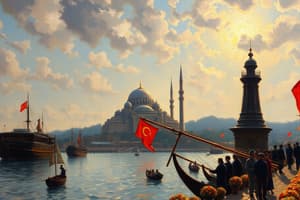Podcast
Questions and Answers
What was a primary reason for European interest in Egypt during the colonial period?
What was a primary reason for European interest in Egypt during the colonial period?
- To establish a new colony
- To prevent Russian expansion
- To promote democracy
- To protect their investment in the Suez Canal (correct)
Which phrase referred to the weakened condition of the Ottoman Empire during the mid-1800s?
Which phrase referred to the weakened condition of the Ottoman Empire during the mid-1800s?
- The Sleeping Giant
- The Crumbling Colossus
- The Sick Man of Europe (correct)
- The Fading Empire
Which European nation gained control of Bosnia and Herzegovina from the Ottoman Empire?
Which European nation gained control of Bosnia and Herzegovina from the Ottoman Empire?
- France
- Austria-Hungary (correct)
- Russia
- Britain
What resource discovery in Persia led to more foreign intervention?
What resource discovery in Persia led to more foreign intervention?
What does the term 'Balkan Powder Keg' refer to?
What does the term 'Balkan Powder Keg' refer to?
Which group within the Ottoman Empire resisted Western-inspired reforms?
Which group within the Ottoman Empire resisted Western-inspired reforms?
How did the Industrial Revolution impact the Ottoman Empire?
How did the Industrial Revolution impact the Ottoman Empire?
What significant consequence resulted from the establishment of the Suez Canal for Egypt?
What significant consequence resulted from the establishment of the Suez Canal for Egypt?
Which of the following was NOT one of the three great Muslim empires in decline by the 1700s?
Which of the following was NOT one of the three great Muslim empires in decline by the 1700s?
What internal factor contributed to the decline of the Muslim empires?
What internal factor contributed to the decline of the Muslim empires?
The Ottoman Empire faced challenges similar to which other empire?
The Ottoman Empire faced challenges similar to which other empire?
What was a major internal pressure faced by the Ottoman Empire in the 1800s?
What was a major internal pressure faced by the Ottoman Empire in the 1800s?
Which reform did Ottoman rulers NOT attempt in the late 1700s?
Which reform did Ottoman rulers NOT attempt in the late 1700s?
What unexpected consequence resulted from improved health reforms in the Ottoman Empire?
What unexpected consequence resulted from improved health reforms in the Ottoman Empire?
Who were the 'Young Turks'?
Who were the 'Young Turks'?
What event occurred in Armenia from 1915-1917?
What event occurred in Armenia from 1915-1917?
Flashcards
Decline of Muslim Empires (1700s)
Decline of Muslim Empires (1700s)
The Ottoman, Safavid, and Mughal empires experienced significant internal problems leading to their decline in the 1700s.
Internal Factor for Decline
Internal Factor for Decline
Widespread corruption weakened the Muslim empires, hindering their ability to govern and recover.
Ottoman Empire Challenges
Ottoman Empire Challenges
The Ottoman Empire faced similar challenges as the Austrian Empire, including rising nationalism.
Ottoman Empire Internal Pressure (1800s)
Ottoman Empire Internal Pressure (1800s)
Signup and view all the flashcards
Ottoman Reform Attempts (late 1700s)
Ottoman Reform Attempts (late 1700s)
Signup and view all the flashcards
Ottoman Health Reforms Impact
Ottoman Health Reforms Impact
Signup and view all the flashcards
Young Turks
Young Turks
Signup and view all the flashcards
Armenian Genocide (1915-1917)
Armenian Genocide (1915-1917)
Signup and view all the flashcards
Suez Canal Investment
Suez Canal Investment
Signup and view all the flashcards
The Sick Man of Europe
The Sick Man of Europe
Signup and view all the flashcards
Bosnia and Herzegovina
Bosnia and Herzegovina
Signup and view all the flashcards
Persian Oil Discovery
Persian Oil Discovery
Signup and view all the flashcards
Balkan Powder Keg
Balkan Powder Keg
Signup and view all the flashcards
Ottoman Reform Objections
Ottoman Reform Objections
Signup and view all the flashcards
Industrial Revolution Impact on Ottomans
Industrial Revolution Impact on Ottomans
Signup and view all the flashcards
Suez Canal Consequence
Suez Canal Consequence
Signup and view all the flashcards
Study Notes
Decline of the Muslim Empires
- Three major empires in decline by 1700s: Ottoman, Safavid, and Mughal Empires. The Umayyad Empire was not one of them.
Internal Factors Contributing to Decline
- Widespread corruption was a significant internal factor weakening the empires. Increased literacy, agrarian reforms, and technological advancements were not.
Ottoman Empire's Challenges
- The Ottoman Empire faced similar challenges to the Austrian Empire.
- Nationalist groups seeking self-rule were a major internal pressure in the 1800s.
Ottoman Reform Efforts
- Ottoman rulers attempted reforms like bureaucracy reform, education expansion, and military training (with European advisors). They did not attempt to abolish the monarchy.
Unexpected Consequences of Health Reforms
- Improved health reforms led to a population explosion in the Ottoman Empire, not decreased life expectancy, reduced agricultural output, or improved relations with European powers.
The Young Turks
- The Young Turks were reformers advocating for liberal change, not military leaders, religious conservatives, or European advisors.
Armenian Genocide
- The period from 1915-1917 in Armenia witnessed a genocide, not an industrial revolution, democratic elections, or an economic boom.
Economic Factors in Decline
- The Ottoman Empire lost its competitive edge in raw materials due to European industrialization, not increased agricultural exports, new industries, or oil discoveries.
Muhammad Ali
- Muhammad Ali was an appointed governor who modernized Egypt, not an Ottoman sultan, a European diplomat, or a leader of the Young Turks movement.
Egyptian Infrastructure
- The Suez Canal was completed in Egypt in 1869, not the Trans-Saharan Railway, Aswan Dam, or Cairo Metro.
British Intervention in Egypt
- Britain took control of Egypt in 1882 to protect its investment in the Suez Canal, not to promote democracy, establish a new colony, or prevent Russian expansion.
Ottoman Empire's Weak State
- The Ottoman Empire's weakened state in the mid-1800s was referred to as the "Sick Man of Europe." Not "Sleeping Giant", "The Crumbling Colossus", or "The Fading Empire."
European Control in the Balkans
- Austria-Hungary gained control of Bosnia and Herzegovina, not Russia, Britain, or France.
Foreign Intervention in Persia
- The discovery of oil in Persia led to increased foreign intervention, not gold, diamonds, or uranium.
Balkan Powder Keg
- The "Balkan Powder Keg" refers to the volatile political situation in Southeastern Europe, not a new explosive, an Ottoman military strategy, or a Russian naval base.
Opposition to Reforms
- Local sultans resisted Western-inspired reforms in the Ottoman Empire. This opposition was not from Young Turks, European advisors, or religious minorities.
Impact of the Industrial Revolution
- The European industrial revolution created economic incentives for exploitation of Ottoman resources, not strengthening Ottoman manufacturing, increasing military power, or leading to Ottoman technological superiority.
Suez Canal & Egypt
- The Suez Canal led to greater foreign influence and control over Egypt, not increased Egyptian control over trade, improved relations with the Ottoman Empire, or economic independence from Europe.
Factors in Ottoman Decline
- Factors leading to the Ottoman decline included rising nationalism among minority groups, economic competition from industrialized Europe, and internal corruption. Not successful modernization efforts were the factors.
Studying That Suits You
Use AI to generate personalized quizzes and flashcards to suit your learning preferences.




